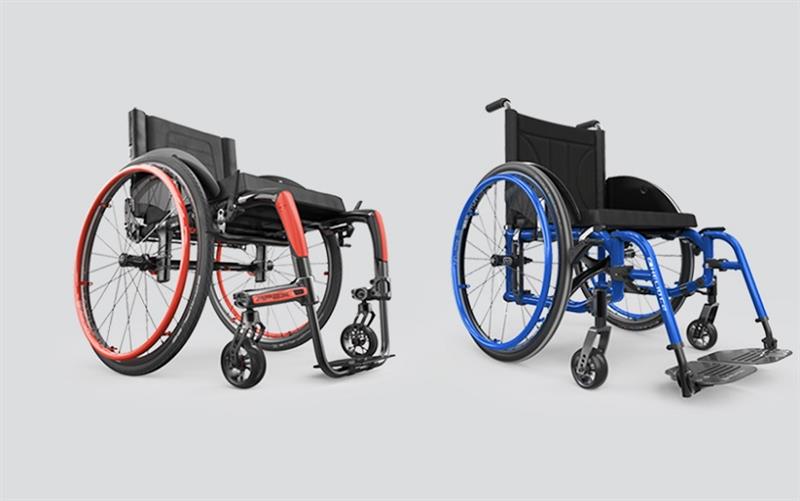
When it comes to choosing a wheelchair, there are various options available to cater to different needs and preferences. Two of the most common types are rigid and folding wheelchairs. Each type has its own set of advantages and disadvantages, making the decision a crucial one for individuals with mobility challenges. In this article, we will explore the differences between rigid and folding wheelchairs to help you determine which one is the right choice for you.
The choice between a rigid and folding wheelchair should align with your specific needs, lifestyle, and preferences. Take into account factors such as mobility requirements, transportation, customization options, and budget. Additionally, consider any medical recommendations or advice from healthcare professionals when making your decision.
Understanding Your Mobility Needs
Before diving into the specifics of rigid and folding wheelchairs, it's essential to assess your individual mobility needs. Consider the following factors:
1. Mobility Requirements
Begin by evaluating your daily activities. Are you looking for a wheelchair primarily for indoor use, or do you require one that can handle outdoor terrain as well? Your mobility requirements will play a significant role in your decision.
2. Transportation
Think about how you plan to transport your wheelchair. Do you need a chair that can easily fit in a car trunk, or will it be a permanent fixture in your home?
Rigid Wheelchairs: Advantages and Considerations
Rigid wheelchairs are known for their durability and performance. Let's delve into their advantages and some important considerations:
1. Superior Performance
Rigid wheelchairs offer excellent performance due to their rigid frame, which minimizes energy loss. This feature allows users to propel themselves with less effort.
2. Lightweight Design
Compared to folding wheelchairs, rigid models tend to be lighter. This makes them easier to maneuver, especially in tight spaces.
3. Longevity
Rigid wheelchairs are built to last. Their sturdy construction ensures they can withstand daily wear and tear.
4. Customization
These wheelchairs can be customized to meet your specific needs. You can choose the frame material, seat dimensions, and other features for a personalized experience.
5. Less Maintenance
Due to their simple design, rigid wheelchairs generally require less maintenance than folding ones. This can save you time and money in the long run.
6. Sports and Athletic Activities
Rigid wheelchairs are popular among athletes and individuals who engage in sports. Their rigid frame provides superior stability and responsiveness, making them suitable for activities like wheelchair basketball, rugby, and racing. If you have an active lifestyle and enjoy sports, a rigid wheelchair may be the ideal choice.
7. Ergonomics
Rigid wheelchairs are known for their ergonomic design. They can be customized not only for fit but also for optimal positioning, which is crucial for long-term comfort and health. These ergonomic adjustments can promote better posture and reduce the risk of pressure sores.
8. Durability
Rigid wheelchairs are built to withstand the rigors of daily use. Their robust construction means they are less likely to require frequent repairs or replacements. This durability can lead to long-term cost savings for users.
9. Improved Efficiency
The rigid frame of these wheelchairs enhances energy transfer, allowing users to move more efficiently. This is especially important for individuals who rely on their wheelchairs for daily mobility, as it can reduce fatigue and strain associated with prolonged use.
Folding Wheelchairs: Advantages and Considerations
Folding wheelchairs are known for their convenience and portability. Here are some of their advantages and important considerations:
1. Portability
Folding wheelchairs can be easily folded and transported, making them ideal for individuals who need a wheelchair on the go.
2. Storage
If you have limited storage space, a folding wheelchair is a practical choice as it can be folded and stored away when not in use.
3. Versatility
These wheelchairs come in various styles, including lightweight models suitable for travel and heavy-duty versions for daily use.
4. Maintenance
Folding wheelchairs may require more maintenance due to their moving parts, so it's essential to factor in ongoing upkeep.
5. Travel-Friendly
Folding wheelchairs are often the preferred choice for travelers. Their compact design allows for easy storage in the trunk of a car or even as carry-on luggage on flights. This level of portability can significantly enhance the freedom and independence of wheelchair users who enjoy exploring new places.
6. Rental Options
Due to their widespread use and ease of transport, folding wheelchairs are readily available for rental at airports, tourist destinations, and healthcare facilities. This accessibility can be a convenient solution for occasional users or travelers who don't wish to invest in a wheelchair.
7. Limited Customization
While folding wheelchairs offer various models to choose from, they generally have limited customization options compared to rigid wheelchairs. This means that if you have specific postural or comfort requirements, a rigid wheelchair may better accommodate your needs.
Making Your Decision
Choosing between a rigid and folding wheelchair ultimately depends on your unique circumstances. Here are some key points to consider:
1. Lifestyle
Think about your daily activities and how a wheelchair fits into your lifestyle. If you lead an active life with frequent outings, a folding wheelchair may be more practical.
2. Comfort
Consider your comfort preferences. Rigid wheelchairs can be customized for a snug fit, while folding wheelchairs may have limited customization options.
3. Budget
Determine your budget for a wheelchair. Rigid wheelchairs can be more expensive due to their durability and customization options.
4. Transportation
If you need a wheelchair that's easy to transport, a folding wheelchair may be the better choice, especially if you frequently travel.